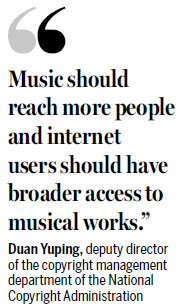Experts: Online music licensing should help prevent monopolies
Copyright officials have called for music to be licensed on numerous online platforms to avoid a monopoly situation that could harm the healthy development of the market.
Online music platforms have rushed to grab exclusive license agreements with record companies, for which some have paid an unreasonably high price, according to Duan Yuping, deputy director of the copyright management department of the National Copyright Administration.
Internet music giant Tencent Music reportedly paid $350 million and shares worth up to $100 million to purchase Universal Music Group's digital copyright in the Chinese mainland. The initial asking price was only $30 million to $40 million.
Tencent also signed similar agreements with another two major record enterprises, Sony Music Entertainment and Warner Music Group, winning itself exclusive rights to release, market and manage their content in the Chinese mainland.

Duan said a monopoly situation would create negative effects both for netizens' rights and the future of the industry.
"Music should reach more people and internet users should have broader access to musical works, which a monopoly situation does not support," she said.
"Exclusive licensing may also cause a resurgence of pirated products, violating the good order of the industry," she added.
Tencent Music's exclusive licensing deals with Sony Music Entertainment and Warner Music are due to end in December 2018 and August 2018, respectively. Industry insiders are warning of a fierce battle among domestic internet music companies aiming to take Tencent's place.
To solve the problem, the National Copyright Administration talked with executive managers of about 20 major mainland online music suppliers, including AliMusic, Tencent Music, NetEase Music and Taihe Music Group, as well as record enterprises such as Warner Music, Emperor Entertainment Group and Sony Music Entertainment.
The administration advised companies to distribute copyright among themselves and to not participate in any collective management of copyright.
A batch of songs was removed from NetEase Music in 2015 after the central government said music can only be transmitted with appropriate authorization. Tencent Music sold around 1.5 million songs to NetEase to keep its operations afloat. However, NetEase was sued again for violation of Tencent Music's copyright in August after their cooperation came to an end.
Yan Xiaohong, president of the Copyright Society of China, said there will be problems if one company holds exclusive copyright and refuses to share it with others.
Duan, from the National Copyright Administration, said internet music service providers needed to deal with copyright disputes via mediation and negotiation first, safeguarding rights in accordance with the law.
AliMusic and Tencent Music have announced a copyright exchange deal involving several million songs, following days of negotiation.
Liu Xin, vice-president of Taihe Music, said the best way to promote multi-enterprise cooperation is to share data related to clicks and broadcasting.
"Video streaming websites allocate revenue by calculating how big an audience a video attracts. However, online music platforms don't share this information, so it is difficult for us to judge the value of a musical product."
Making data more transparent could also help improve the quality of music, he added.
chenmeiling@chinadaily.com.cn

(China Daily 11/02/2017 page17)














